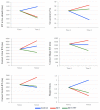Comparing the Efficacy of Two School-Based Approaches of Neurocognitive Training for Enhancing Executive Functions
- PMID: 36291437
- PMCID: PMC9601256
- DOI: 10.3390/children9101501
Comparing the Efficacy of Two School-Based Approaches of Neurocognitive Training for Enhancing Executive Functions
Abstract
Neurocognitive training has been shown to improve a range of cognitive/executive functions and behavior in children. Delivering this training in a school context may enhance its ecological validity and improve training outcomes. The current study examined the efficacy of two school-based neurocognitive training approaches for enhancing executive functions (EF) in typically developing children: neurocognitive training with no teacher positive feedback (NCT), and neurocognitive training with teacher positive feedback (NCT-TPF). Using a randomized control design, 45 children were randomly allocated to the no-training control, NCT, or NCT-TPF group and completed pre- and post-training assessments on the core executive function (EF) domains of inhibitory control, working memory, and task switching. Teachers' subjective acceptance of the two training protocols was investigated to explore potential ecological validity. The two training groups completed six sessions of training in a kindergarten over a 3-week period. The results showed significant post-training improvements in an untrained inhibitory control task for both training groups when compared with the control group. Different effects were found for each group for the untrained task switching task. While reduced reaction time (RT) in correct Color and Shape trials at Time 2 were reported for the NCT-TPF group, there was no difference compared to the control group for the NCT group. The NCT group showed increased RT in Switch trials but reduced Shape errors compared to controls at Time 2, while these effects were not significant for the NCT-TPF group. An unexpected outcome was that children in both training conditions did not show a significant improvement in an untrained working memory task. Teachers' subjective acceptance consistently supported including positive feedback as part of NCT. While further research is needed, these results support use of neurocognitive training and/or neurocognitive training with teacher positive feedback for typically developing children in a school context.
Keywords: ecological validity; inhibitory control; neurocognitive training; task switching; teacher positive feedback; working memory.
Conflict of interest statement
The author(s) declared the following potential conflict of interest with respect to the research, authorship, and/or publication of this article: S.J.J. is a co-inventor of the cognitive training methodology used in this study which was licensed by University of Wollongong (UOW) to Neuro Cognitive Solutions Pty Ltd. from 2013 to 2016. He was entitled to a portion of royalties received by UOW in relation to the sale of any product using that methodology during that time. There are no current licensing agreements in place.
Figures
Similar articles
-
Improving executive functioning in children with ADHD: training multiple executive functions within the context of a computer game. a randomized double-blind placebo controlled trial.PLoS One. 2015 Apr 6;10(4):e0121651. doi: 10.1371/journal.pone.0121651. eCollection 2015. PLoS One. 2015. PMID: 25844638 Free PMC article. Clinical Trial.
-
Can task-switching training enhance executive control functioning in children with attention deficit/-hyperactivity disorder?Front Hum Neurosci. 2012 Jan 3;5:180. doi: 10.3389/fnhum.2011.00180. eCollection 2011. Front Hum Neurosci. 2012. PMID: 22291628 Free PMC article.
-
School-based interventions for reducing disciplinary school exclusion: a systematic review.Campbell Syst Rev. 2018 Jan 9;14(1):i-216. doi: 10.4073/csr.2018.1. eCollection 2018. Campbell Syst Rev. 2018. PMID: 37131379 Free PMC article.
-
[Efficacy of frequency-neurofeedback and Cogmed JM-working memory training in children with ADHD].Tijdschr Psychiatr. 2015;57(7):508-16. Tijdschr Psychiatr. 2015. PMID: 26189419 Review. Dutch.
-
Boosting brain functions: Improving executive functions with behavioral training, neurostimulation, and neurofeedback.Int J Psychophysiol. 2013 Apr;88(1):1-16. doi: 10.1016/j.ijpsycho.2013.02.001. Epub 2013 Feb 13. Int J Psychophysiol. 2013. PMID: 23415793 Review.
References
-
- APA . Diagnostic and Statistical Manual of Mental Disorders: DSM-5. American Psychiatric Association; Arlington, VA, USA: 2013.
-
- Reichow B., Volkmar F., Bloch M. Systematic review and meta-analysis of pharmacological treatment of the symptoms of attention-deficit/hyperactivity disorder in children with pervasive developmental disorders. J. Autism Dev. Disord. 2013;43:2435–2441. doi: 10.1007/s10803-013-1793-z. - DOI - PMC - PubMed
Grants and funding
LinkOut - more resources
Full Text Sources


